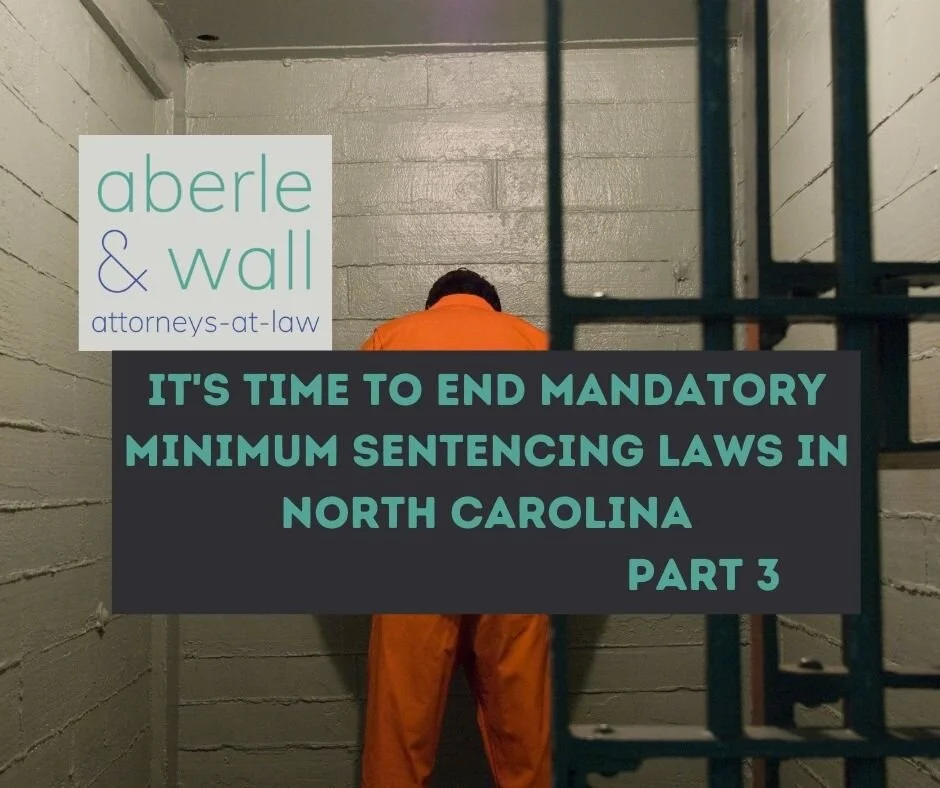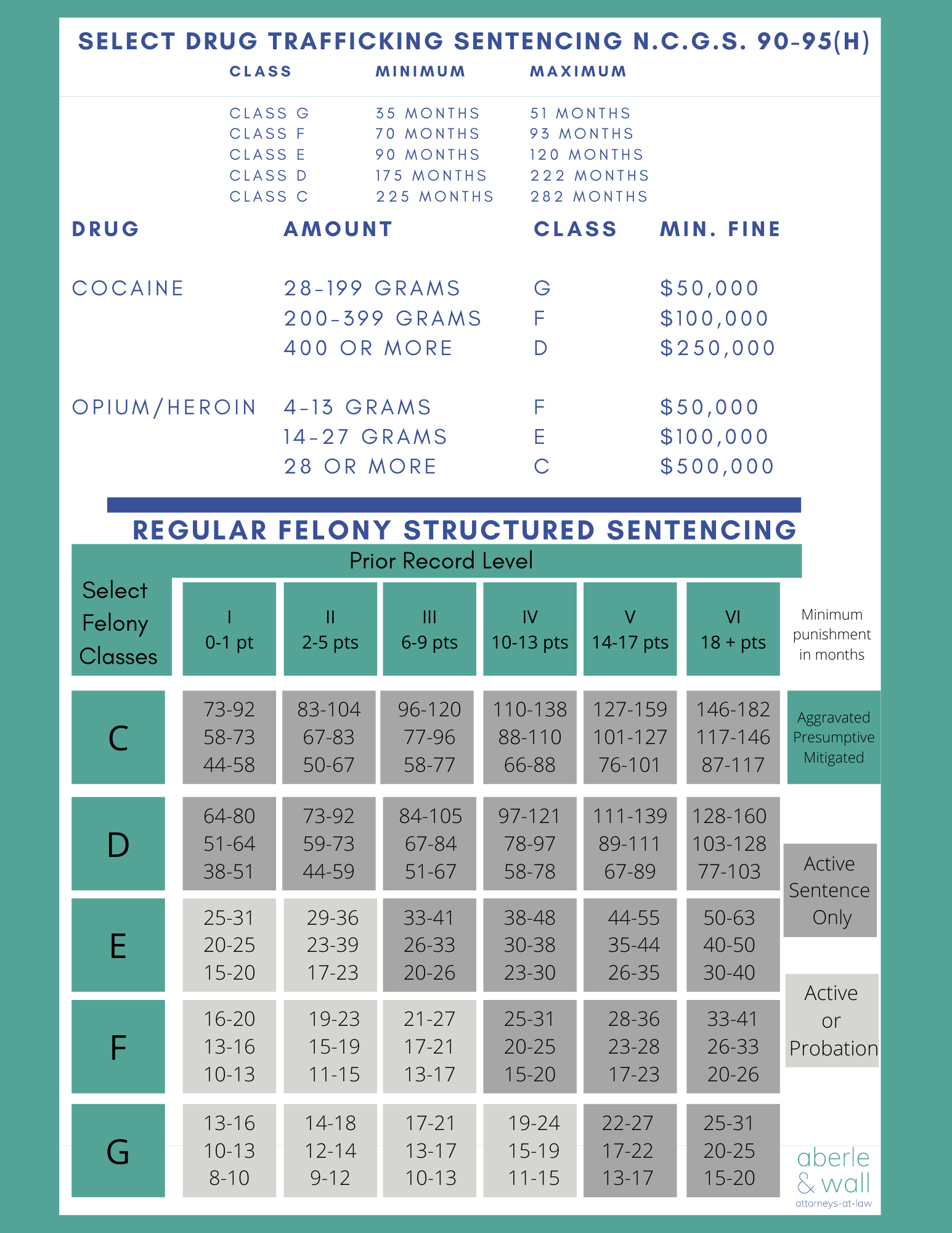It’s Time to End Mandatory Minimum Sentencing in North Carolina (Part III of III)
Brennan Aberle, Partner
Aberle & Wall
This blog post is part of a three part series on North Carolina’s mandatory minimum sentencing laws for drug trafficking. Each part follows the story of a defendant based on a real client. Part 1 provides a basic explanation of North Carolina’s drug trafficking and mandatory minimum sentencing laws. Part 2 focuses on the social harms of mandatory minimum sentencing and a recent reform bill that the North Carolina General Assembly passed in June of 2020. Part 3 explores what a criminal justice reform bill might look like that abolishes or substantially reduces the impact of mandatory minimum sentencing laws, while still holding real drug traffickers accountable.
If you have read part 1 of this series, you are familiar with drug trafficking and minimum sentencing laws are in North Carolina. If you read part 2, you saw the date on how mandatory minimum sentencing is expensive, ineffective, and bad public policy. You also know that in a moment when criminal justice reform is enjoying bipartisan support at the state and federal level, North Carolina passed the First Step Act which may have little to no effect at all on addressing the social harms of mandatory minimum sentences. This part is a proposed alternative to the status quo and call to action to contact your legislators and plead for a reform bill that meaningfully restructures a sentencing system that disproportionately affects poor and black defendants.
Abolishing Mandatory Minimum Sentences
Before I talk about ways to reform drug trafficking laws, consider for a moment the idea of what would happen if we just ripped mandatory minimum sentences out of the books without replacing them with anything. Would the world continue to turn? Of course it would. Here is why: as I showed you in part 1, we already have a structured sentencing system that we use for almost every other crime that punishes you for the length of your criminal record and the severity of your crime. The chart is available here. Let’s take the heroin and opium example. Here is a comparison of what your sentence would be under the current mandatory minimum sentence structure (top) and under the normal structured sentence (bottom).
Using the top of this chart and looking at mandatory minimum sentencing, we know that no matter what your record is, if you are convicted of Class F trafficking heroin, you are going to serve 70-92 months in prison. If it is Class E trafficking heroin, you will serve 90-120 months and if it is class C trafficking, you will serve 225 to 282 months. Now, if you simply removed the top half of the chart and got rid of mandatory minimum sentences, we would use the bottom chart. Now the bottom chart is a little more complicated, but it should be. We shouldn’t be treating subjecting people with little to no criminal record to the same sentences as those with lengthy records.
Let’s go back to our example of Aaron from parts 1 and 2. Assuming those 15 hydrocodone pills weight between 14 and 27 grams, he would be charged with four separate Class E felonies. All of those require a mandatory minimum sentence of 90 to 120 months. If he loses only one of those charges at trial, he will have to serve between 8-10 years in prison. A judge could make him serve 40 years, with no record, if he is convicted of all four counts.
Now let’s look at the bottom chart which applies to almost every other crime but drug trafficking. If Aaron has no record at all, and is charged with all four felonies described above and loses at trial, there are many more outcomes. Look at the box for a record level 1 offender, charged with a class E felony. The box he is in allows a judge to give him active time or probation depending on the situation. If you scan further down that row, you will see that Aaron couldn’t get probation if he was a record 3, 4, 5, or 6.
As you can see, if you simply removed mandatory minimum sentencing there would still be a way to punish drug traffickers in a more equitable way. Arguably, this is the only equitable way to do so. Prosecutors can still seek to have multiple charges on more serious drug traffickers and reduce charges for less serious ones. This system gives judges more discretion, ensures that innocent people are more likely to fight their cases, allows the vast majority of prosecutors who were already doing the right thing to continue to do their jobs while placing an important limitation of power on anyone who might choose to abuse it.
Reforming Mandatory Minimum Sentences
If abolishing mandatory minimum sentences still seems unpalatable to you, here are a list of reforms that would have a enormous impact on remedying the social harms of strict drug trafficking laws.
Raise the Quantity Amounts for Trafficking
The lowest level for trafficking marijuana begins at 10 pounds. Personal feelings about marijuana legalization aside, this quantity actually makes sense for trafficking. Most people do not possess 10 pounds of marijuana for personal use. This is a good first-level quantity amount because the most likely possessor of 10 pounds of marijuana is an actual drug trafficker. Heroin and opium, however, start at 4-14 grams for entry level trafficking with a steep mandatory minimum sentence of 6 years and 10 months. Possessors of this quantity of heroin or opium are not usually actual drug traffickers. This is particularly true because, as we learned in part 1, this weight can be determined by a “mixture containing” and prescription pills that are mostly simple acetaminophen.
It is highly admirable to take opioid addiction seriously, but the solution isn’t to make possession of tiny amounts of it eligible for lengthy mandatory prison sentences and label simple users that are struggling with addiction, “drug traffickers.” By evaluating these quantity levels and raising them, we can ensure that a lot of people making a first time mistake, don’t end up missing most of their formative years by spending it in prison.
Erase the “Mixture Containing” Language from the Drug Trafficking Statutes
By simply taking out the “mixture containing” language of the opium and heroin trafficking statute, we substantially reduce the chance that a young person with some prescription pills is going to be facing a trafficking sentence unless they are actually possessing a large enough quantity of those pills to not likely be just for personal use. They may still be charged with a felonies such as Possession of a Schedule I or II substance or Possession with Intent to Sell/Deliver a Schedule I or II substance but these charges don’t put people in prison for decades.
Eliminate the Requirement that Drug Trafficking Sentences Must Run Consecutive to any Active Sentence that the Defendant is Currently Serving
This would be a small change, but current law requires that if you are currently serving a sentence, any drug trafficking sentences must run consecutive to that. That means, you can’t start serving your mandatory minimum sentence until you have finished your current sentence. It is likely only a small group of people affected, but it is just another way that judges have had discretion taken away from them. Some situations may warrant a judge being allowed to impose a sentence concurrently, which means “at the same time” as a sentence the defendant is currently serving.
Eliminate Trafficking by Possession
This suggestion and the next one are designed to prevent overcharging and give people more of a reason for an innocent person to take a case to trial if they are only looking at one sentence instead of potentially 3-4 if they lose. One way to do that is to eliminate trafficking by possession. Those drugs got there somehow. Charge the person with transporting it if they moved the drugs, or selling it, or distributing it. These are actions consistent with actual trafficking. We can still make possession of a large amount of drugs a serious crime, but it shouldn’t carry a mandatory minimum sentence. There also shouldn’t be potentially 3-4 ways for a judge to sentence someone consecutively under multiple theories of trafficking the same substance.
Make it Impossible to Receive Consecutive Sentences for Multiple Trafficking Charges of the Same Substance
As we discussed in part 1, a judge has the power to give you mandatory minimum for holding the drugs (possession), and the driving the drugs (transportation), and then selling the drugs (sale), and for conspiring with one other person to do any one or all of those steps (conspiracy). A judge caught on a bad day could give someone 75 years for 28 grams of heroin if someone was charged all four of those ways. This is because each of these are slightly separate crimes and Double Jeopardy does not prevent you from being sentences on all four of them The North Carolina legislature can change that with a simple law that prohibits this. The law could require that if the substance is the same for each of those different counts, only one may be imposed.
Take Action Now
I hope that these three blog posts have encouraged you to join the fight to reform or abolish mandatory minimum sentencing. Though I can’t convey the human cost in writing, I assure you that it is painful to watch a parent see their child be sentenced to a mandatory minimum for a non-violent crime. You owe it to those families to read their stories, get involved in with the diverse array of organizations calling for reform, and most importantly: to call your local North Carolina Senators and Representatives. It is super easy to do and you always get a nice legislative aide on the phone who is willing to listen to a constituent. Tag legislators’ pages when you post about this topic or share this story.
Remember, the North Carolina General Assembly passed two recent reform bills unanimously. There is no better time than now to finally put an end to one of the ugliest facets of our criminal justice system. Check out the links below to get more involved:
American Civil Liberties Union of North Carolina
Families Against Mandatory Minimums
Conservatives for Criminal Justice Reform


